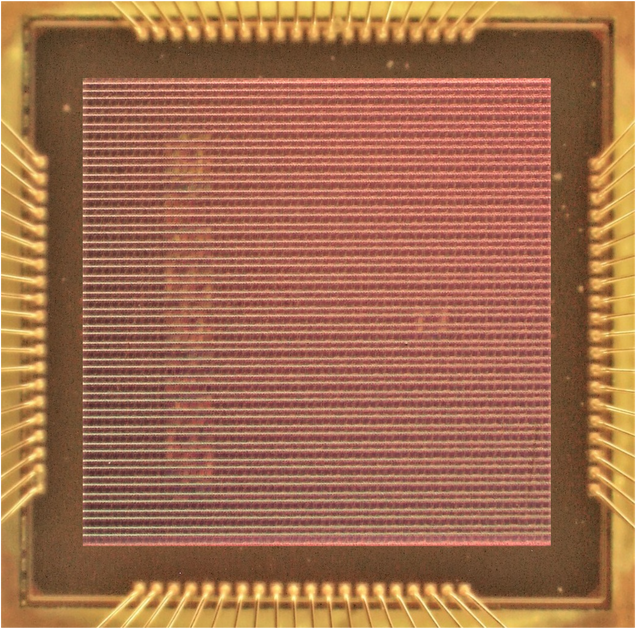A New Decoder Chip Breaks the Record for Energy Efficiency for Longer Battery Life and Hardware Sustainability
Whenever information is exchanged, whether it is in the form of text, audio, or video, it is transmitted through a medium known as a channel. During this transmission, the information is susceptible to corruption by various forms of interference known as noise. To preserve the accuracy of the transmitted message, it is encoded at the transmitter side by adding redundant bits and decoded on the receiver side where the effect of noise is eliminated. Without the decoder chip, the message would be incomprehensible. This makes the decoder an essential component of every communication system.

Recently, Professor Rabia Yazicigil (ECE) together with her Ph.D. students Arslan Riaz (ECE) and Alperen Yasar (ECE), Postdoctoral Associate Furkan Ercan (ECE), and others designed a new decoder chip called ORBGRAND (Ordered Reliability Bits Guessing Random Additive Noise Decoding) in collaboration with Professor Muriel Medard (MIT) and Professor Ken Duffy (Northeastern University). This soft-detection decoder chip is the first of its kind, offering a universal solution that surpasses the performance of state-of-the-art code-specific decoders by providing between 10 to 100 times greater efficiency. Additionally, it has a small footprint, making it an ideal solution for applications that require compact and energy-efficient hardware. This could mean cheaper products and longer battery life along with compatibility with any coding scheme that opens doors to many different applications, simultaneously. This work was presented at the International Solid-State Circuits Conference (ISSCC) held on February 22nd, 2023 in San Fransisco, California. A real-time demonstration of the chip was presented in the demo session of the conference.
Noise happens when several transmissions are occurring at the same time due to cross-talk. It can also happen due to interference with other unwanted signals in the channel. Yazicigil and the team’s work revolves around eliminating the effect of noise in an energy-efficient way.
Most decoder chips are specific to a certain encoding algorithm. Thus, the hardware is tightly coupled to the coding scheme that has to be pre-determined, limiting the applications. However, ORBGRAND is a universal decoder, which means no matter what algorithm the sender is using, the chip can decode it. A single ORBGRAND chip can replace all the existing code-specific decoding chips while providing better energy performance and utilizing a small hardware footprint. The chip is named after the ORBGRAND algorithm, invented by collaborators, Prof. Muriel Medard at MIT and Prof. Ken Duffy at Northeastern University.

ORBGRAND is the soft-detection variant of GRAND (Guessing Random Additive Noise Decoding), which Yazicigil designed previously. Hard-detection GRAND assumes that the probability of the occurrence of an error anywhere in the received information is equally likely. However, in a soft-detection scenario, the receiver provides additional information called soft information that tells the receiver’s confidence level about each information bit. Thus, ORBGRAND being a soft decoder, uses this soft information to target the bits to be flipped in a smarter way according to their reliabilities that increase the accuracy of guessing the noise.
“Typically when receiving information, decoders try to figure out what the information is that’s being sent. Here, what’s happening is the chip is not trying to guess what was sent– it’s trying to guess the error that changed the message,” Yazicigil said.
Yazicigil and the team were the first to break below the 1 picojoule-per-bit barrier for decoding, which is the lowest energy decoder compared to what has been demonstrated before. Riaz, the lead designer, helped to accomplish this energy efficiency by taking the algorithm and mapping it efficiently to the hardware.
“Arslan was able to optimize the system performance by modifying the system blocks such as the sorter for sorting the soft information for very low power consumption and area, efficient implementation of generating test noise patterns, and dynamic clock gating of the system that adapts its performance to the channel noise conditions without any feedback,” Yazicigil said.
Yazicigil said this chip has numerous applications like virtual reality, augmented reality, real-time video streaming, and 5G networks because of its competitive decoding performance and low energy and hardware utilization. Yazicigil also said this new chip will improve sustainability since it is future-compatible, allowing the hardware to stay the same when there is a new coding scheme. Yazicigil said the chip will remove the need for standardization for decoders. ORBGRAND will pave way for reducing the amount of hardware in devices, faster and more efficient decoding, longer battery life, and cheaper products.
This work was funded by the U.S. Defense Advanced Research Projects Agency (DARPA) and Science Foundation Ireland.